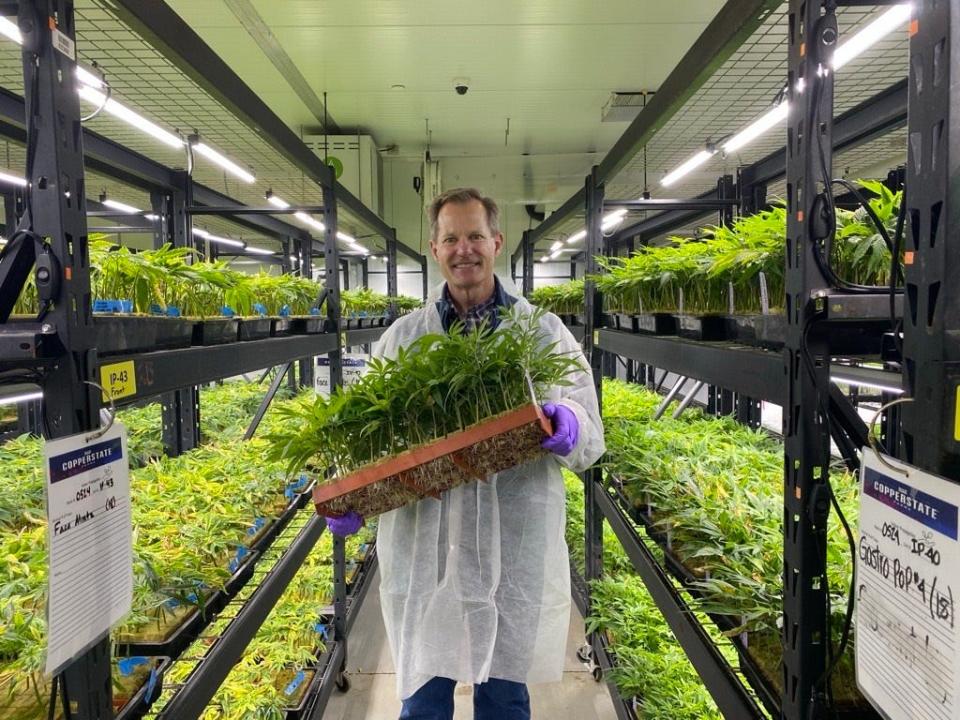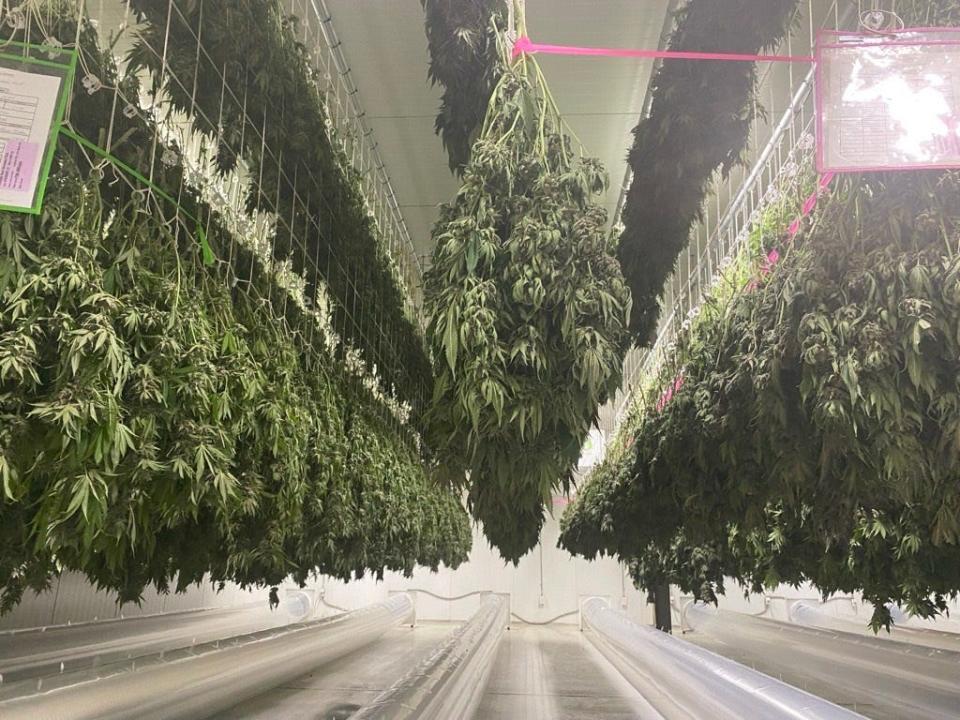How the largest cannabis greenhouse in Arizona helped revamp Snowflake's rural economy
SNOWFLAKE — As the sun rises across the White Mountains, many in northern Arizona are still trying to catch a few more hours of sleep.
But at Copperstate Farms, nearly 200 employees are already hard at work throughout the 40-acre cannabis greenhouse on the northwest side of Snowflake.
Workers dressed head to toe in personal protective equipment to safeguard their highly sensitive crop are busy at work monitoring the thousands of plants in the latest harvest and trimming the top-tier flower by hand to get it ready for sale.
Now eight years into operation, the greenhouse is the largest in the state and home to every aspect of growing and harvesting cannabis. With a process fine-tuned over the years, it now takes just about 140 days from when a seed is planted to when it reaches a consumer at an Arizona dispensary.
And the economic impact is clear, Snowflake town manager Brian Richards said.
“Over the last eight years our revenues have increased, our populations increased, our building has increased and Copperstate has been a part of that,” Richards told The Arizona Republic.
According to annual financial reports, local sales tax revenue for Snowflake increased just under 287% between 2016 and 2023.
“This is a very tight-knit, family-oriented community — big families, lots of kids — and you could really start to see businesses thriving, new businesses opening up and not just opening up and closing,” said greenhouse general manager Barbara Hansen.
When cannabis came to town
In the years leading up to Copperstate Farms moving in, the area saw two of the largest employers close.
The Snowflake paper mill closed when operations moved to Willcox in 2012 and the NatureSweet vegetable greenhouse closed three years, later resulting in the loss of about 300 total jobs.

By the time Copperstate Farms CEO Fife Symington IV came to town in 2016, the greenhouse had sat unused, and the local economy was reeling from the widespread job losses.
Symington, the son of former Arizona Governor Fife Symington III, worked hard to win over residents who were skeptical of bringing such a large cannabis operation into town.
“I would meet with anybody that wanted to meet with me and talk about what I wanted to do here, my vision for the place,” Symington said.
The operation eventually got its special use permit from the town council and had its first harvest in August 2017.

To some, the tight-knit and heavily religious community might have seemed like an odd choice for the state’s largest cannabis operation.
But eight years in, Copperstate Farms is now an unlikely but welcome neighbor in a community where the vast majority are members of the Church of Jesus Christ of Latter-day Saints. The greenhouse sits just 3 miles away from the town’s temple.
“We have a lot of members of that community and the church who work here,” according to Hansen.
Why Snowflake?
While northern California might be the most well-known area in the country for large-scale cannabis production, the high desert in northern Arizona offers a unique environment that is ideal for this growing industry.
“It really is the perfect place to grow cannabis,” said Tim Nolan, COO at Copperstate.
Nolan has been in the cannabis industry for 15 years working previously in indoor grow operations in Colorado and Nova Scotia before coming to Arizona where he transitioned to working in a greenhouse.

The greenhouse allows them to control the temperature and humidity and utilize the natural light coming in while avoiding the dust and wind that would impact the plants if they were a completely outdoor operation.
The high desert also allows them to utilize the dry air that they have outside to maximize operations on the inside of the greenhouse, Nolan said.
“We wouldn’t be able to do this in the Valley,” he said.
And while the natural climate in the White Mountains benefits the cannabis operation, so to does the knowledge and skill that come from a community with a rich history in agriculture.
“It’s remarkable how many great growers and talented people that we’ve pulled out of a relatively rural community,” Nolan said.

Symington, Nolan and lab director Mitch Lindback are some of the only Copperstate employees who travel from the Valley for work. The rest of the nearly 200 employees live locally in Snowflake and Taylor or in neighboring towns across the White Mountains including Show Low, Pinetop-Lakeside and onto the Navajo Nation.
It was all part of the promise that Symington made when he first pitched his vision for Copperstate Farms to local residents and community leaders.
“It was a huge commitment I made to the town saying, ‘I’m going to hire up here whenever I possibly can for all of these jobs,’ and if you look around at this facility, there’s only four or five people who are from somewhere else,” Symington said.
An economic boom in rural Arizona
Hansen, the general manager of the greenhouse, was one of the first people to start working for Copperstate and helped lead the hiring process.
“She’s Snowflake through and through,” Symington said.
Hansen joined the company before it even really existed because she was so optimistic about what it could mean for the town economically after so many years of hardship.
The economic impact at the time of the closures was so widespread that the home improvement center that Hansen was managing in Taylor during that period was forced to close as well.
By the time Copperstate first began hiring, the demand for jobs in the area was obvious, especially when the company received 1,600 applications in the first hiring round.
Those initial applicants were sorted by, “who used to work here, who lost their job and who lives in Snowflake and Taylor,” Hansen said.
“Everyone that applied that used to work here that was interested in what we were doing, we brought them back and many of them still work here,” she said. “They’ve lasted longer than anybody else.”
In the hiring rounds that followed, they widened their net across the region into surrounding towns like Show Low, Heber, McNary and more.
With so many people finally back at work, the small town’s economy eventually started recovering. One way that Copperstate was able to do this directly was to rely exclusively on local contractors as they grew and expanded over the years, she said.
“We got to put our hometown to work,” she said. “Anything that we could get locally, we got.”
Providing opportunities for local workers
At the same time, Copperstate has become a premier employer across the White Mountains, offering a competitive $17 starting hourly wage and providing opportunities for job growth and advancement in a burgeoning industry.
Ana Grajeda initially applied for a job at the company because despite not being a cannabis user, she was curious about the growing process. For four years, she commuted an hour to work from St. Johns before buying a house in Snowflake three years ago.
She initially started in the greenhouse but like most of her coworkers, she was trained in all the roles throughout the growing process from propagating to harvesting and everything in between.

Now, Grajeda utilizes her background as a hairstylist to lead the team in charge of meticulously trimming the company’s top-tier flower — what Nolan described as “a deceptively difficult thing to do.”
“I love it,” Grajeda said as she leaned over a bin full of cannabis and made precise cuts to get the product ready for sale.
Cross-training employees like Grajeda allows for the company to better utilize their staff while also avoiding the monotony of the growing process that repeats itself every three weeks.
So while employees develop a more holistic understanding of the business, they also achieve a higher level of job enrichment because they’re more deeply involved in the process, she said.
“We wanted to have a small business feel with a big business mentality,” she said.
Reach the reporter at LLatch@gannett.com.
The Republic’s coverage of northern Arizona is funded, in part, with a grant from Report for America. To support regional Arizona news coverage like this, make a tax-deductible donation at supportjournalism.azcentral.com.
This article originally appeared on Arizona Republic: How the largest cannabis greenhouse in AZ helped revive a rural economy

